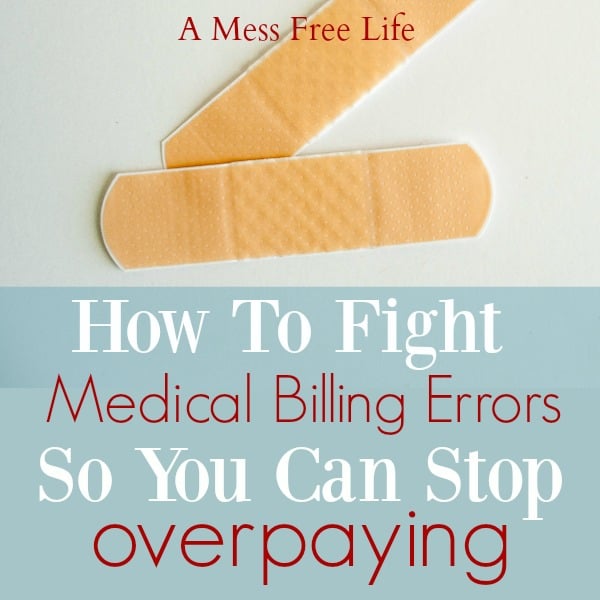A Mess Free Life may collect a share of sales or other compensation from the links on this page.
If you’re dealing with an illness or ongoing treatment for a diagnosis, you may be paying more than you should. Medical billing errors are unfortunately very common and most people don’t know what to look for and how to address the errors.
And unless they are errors that your health insurance is paying for, your insurance company most likely won’t find them either. Their only concern is what they owe; they won’t review your portion of the bill to make sure you’re being billed correctly. You’re on your own!
I experienced this first hand a few years ago when I had major surgery.
When the bills started to roll in something seemed off about the amounts of money that I was expected to pay.
Plus they were billing me for doctors visits that should have been covered, but the bills were stating my doctor was out of network. It was a huge mess.
But I wasn’t just going to take their word. I dug in and did my research and I’m going to share with you today how you can spot these errors so you don’t get taken for a ride.
Table of Contents
8 OF THE MOST COMMON MEDICAL BILLING ERRORS AND HOW TO SPOT THEM
INCORRECT INFORMATION
Something as simple as a typo can lead to your claim being denied.
Common misspellings and typos include address, account number, date of birth, and other identifying information. If the information isn’t correct, your claim may be denied. Be sure to double check all of this information to ensure it’s correct, both when you fill out the forms in your doctor’s office and when they give you your receipt for your visit.
Just because you wrote it down correctly does not mean they entered it correctly and since your doctor’s office will most likely file the claim on your behalf it’s important to make sure they have your information correct.
DUPLICATE CHARGES
This can be caused by another typo, the billing specialist entering a “2” instead of a “1” under the quantity of tests run. And this error can lead to additional charges for you or your insurance company denying the claim.
Make sure you receive an itemized bill with each visit and review it to ensure that you weren’t billed twice for a procedure or test you only received once.
CANCELLED TESTS AND PROCEDURES
Just because a test or procedure is canceled doesn’t mean the billing specialist didn’t charge. This is usually caused by a lack of communication and is not intentional.
Again, review your itemized bill for any incorrect charges. If you feel you were incorrectly charged, gather your necessary documents and dispute the charge. This may involve a call to the doctor’s office instead of the insurance company so that they can correct the information and resubmit the claim for faster processing.
UPCODING
This is when a hospital inflates the patient’s diagnosis to create a higher bill. For instance, you may have received a simple, low-level emergency room service but you’re billed at a higher level.
This is a fraudulent practice and leads to higher medical bills as well as higher premiums. If you see a charge like this, ask your healthcare provider to correct it immediately.
UNBUNDLING
This term refers to service being billed separately when they were all part of the same procedure code. It can be difficult to find unless you’re a certified medical bill coder. If you suspect this has happened, you can find more information here to help you resolve the issue.
INCORRECT QUANTITY
Items such as medications and syringes may be charged incorrectly if the wrong quantity is entered in the billing information. Be sure to carefully review your statements and receipts to ensure that you were billed correctly.
Your insurance company may pay for a 30-day supply every 30-days, but if you were inadvertently charged for two 30-day supplies at one time, you will be billed for the difference.
Are you finding this article useful in helping you save money? Here is more money saving articles:
How To Save Money When Shopping Online | Best Money Saving Tips
Why Shopping With Purpose Will Save You Money
9 Clever Food Hacks That Can Save You Money
BALANCE BILLING
If you went to an in-network service provider, you may find yourself with incorrect charges.
Balance billing is when your health care provider bills you for charges other than co-payments or charges you for things that should have been charged to your health insurance company. If your provider was in-network, these charges are inappropriate.
Be sure to compare your bill to the receipt you received at the time of service. Balance billing most commonly occurs when you are treated out-of-network for non-emergency care. The doctors will set the rate to charge you instead of charging what the insurance company allows. The result is that you get stuck with a bigger bill than normally allowed.
OPERATING ROOM AND ANESTHESIA TIME
If you had surgery, be sure to check your medical records to confirm how long you were in the operating room and/or under anesthesia. Charges are usually billed in 15-minute increments so mistakes can add up very quickly. And if your insurance company has a maximum allowance for payment, you may end up paying the remaining bill for incorrect charges.
NOT VERIFYING COVERAGE
Don’t get caught with a bill you didn’t expect to receive for services you thought were covered.
Be sure to verify that you are covered for certain procedures and tests before getting them done. For instance, your insurance company may require a referral from your primary care physician to see a specialist. If you receive this referral, your insurance company should cover the charges with the exception of your co-pay. However, if you don’t get this referral in advance, you may be on the hook for the entire bill with the specialist because you did not receive pre-approval.
DIAGNOSIS AND TREATMENT MISMATCH
Although it’s most likely an oversite, there are times when the diagnosis you receive from your doctor does not match the treatment your insurance company is billed for.
In this case, the insurance company will deny the claim because they think you received treatment that wasn’t approved based on your diagnosis. It’s important to review your receipts from the doctor’s office and any bills you receive. Fighting the insurance company to get it corrected and covered can be very time-consuming.
This is another instance where it may make more sense to have the doctor’s office correct the billing and resubmit to the insurance company.
CONCLUSION
Medical billing errors are costly on many levels. They can cost you money for payments you made but didn’t really need to. They can cost you valuable time in fighting incorrect bills. And billing errors can even increase your premiums, costing you more money in the long run.
Be sure to review all of your receipts from your service providers and compare them with the invoices and statements you receive from the insurance company. You are your own best advocate to make sure you’re not paying more than you should for your medical treatment.



